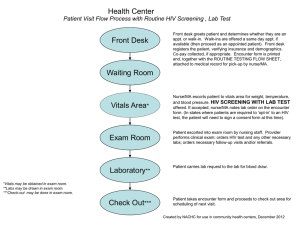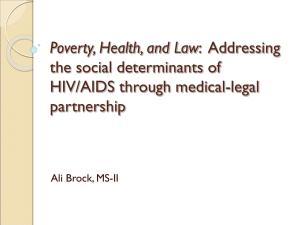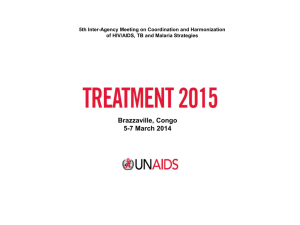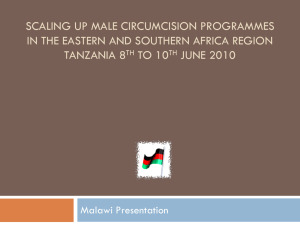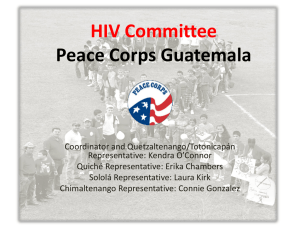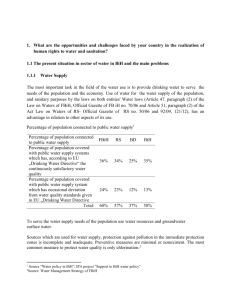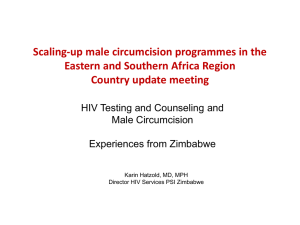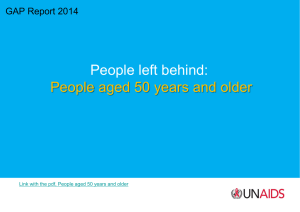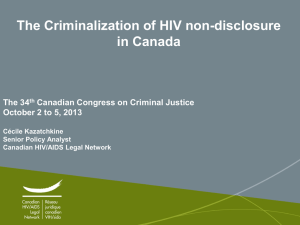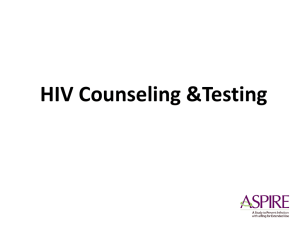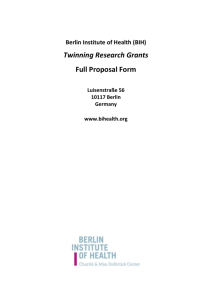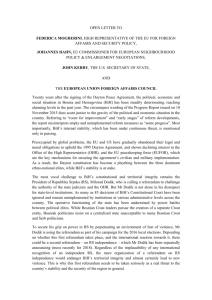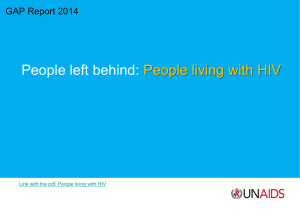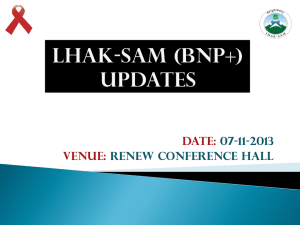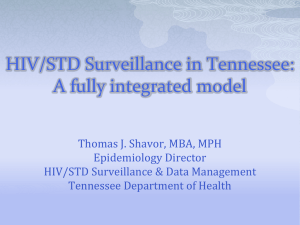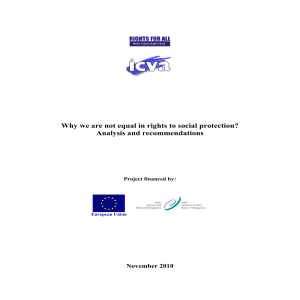Costing and Sustainability of HIV/AIDS Interventions in Bosnia
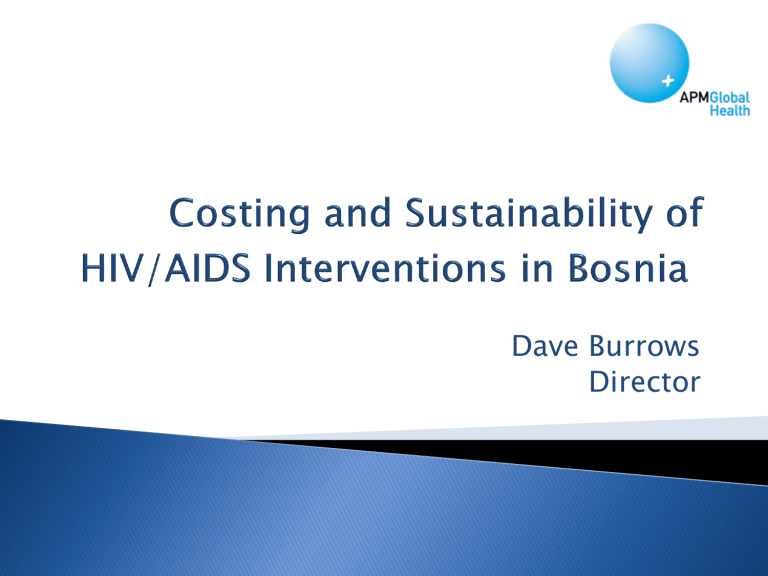
Dave Burrows
Director
Situation in Bosnia and Herzegovina
(BiH)
Strategic Investment Framework
Capacity Assessment
Roadmap to Transition and
Sustainability
GF HIV funding to end for BiH in 2015
Independent Evaluation of National
HIV Programme in BiH in 2013
High priority recommendation: to develop a Transition and Sustainability
Plan for HIV Programming
UNDP is PR, contracted APMG to develop plan
Structure of BiH developed as key part of
Dayton Peace Accord to end Bosnian war
BiH consists of 2 entities (Republic of
Srpska or RS & Federation of BiH or FBiH)
& 1 autonomous district (Brčko)
These 3 separate ‘governing bodies’ have a total of 183 ministries, each with a department, staff etc
Devastating floods in May 2014
Structures and strategies to address HIV and TB are considered the only effective national programs in BiH
Evaluation found that existing system of government & NGO partners have collaborated to keep BiH as a low-level
HIV epidemic, preventing a concentrated epidemic
245 registered HIV cases (126 with AIDS) from population of 3.8m
Good expenditure, costs data from UNDP on GF-funded activities
Counterpart financing more problematic:
◦ Budgets available without disease-specific expenditure
◦ 11 health insurance funds (HIFs)
◦ Varied estimates of those uninsured
◦ Legal requirement for government to pay for uninsured, but no budget
◦ Beyond HIFs, very little contribution from national sources to HIV funding
FBiH: Government expenditure on health was only 25% of proposed budget
RS: greater expenditure but budget not published
In both entities, government expenditure on health is low; and none is directly relevant to the HIV Programme.
Up to 40% of population not covered by
HIFs
Out-of-pocket payments common; 1 estimate = 40% of health care financing
EU/WB assessment found:
◦ Biggest floods in 120 years
◦ Total economic impact: 3.98 billion BAM (2.03b
Eu) = about 15% of GDP
◦ Economy predicted to contract by 0.7% in 2014
◦ Will require about 500m BAM in recovery funds and 3b BAM for reconstruction
Difficult to see how BiH governments can increase investment in HIV in near future
Adapted tool on Country Ownership of HIV
Care and Treatment, developed by USAID
Measured:
◦ Adequacy of human resources;
◦ Leadership;
◦ Guidance by effective policies;
◦ Functioning of operating systems (with an enabling environment);
◦ Effectiveness of management systems;
◦ Sustainability of infrastructure and resources
◦ Fiscal transparency and accountability
100%
90%
80%
70%
60%
50%
40%
30%
20%
10%
0%
43%
85%
65%
43%
23%
60%
70%
Human recources
Leadership Enabling enviroment
Operating sustem
Quality of services
Financial recources
Fiscal management
56%
MEAN SCORE
1.
Identify all desirable interventions of HIV programme with specific reference to key populations.
providing ART for PLHIV and treating OIs; counselling and support for PLHIV and families of PLHIV; treatment for prevention: providing ART for preventing HIV transmission among discordant couples; providing HIV prevention services for women and girls who are pregnant; focusing outreach on people at higher risk: PWID (including young people and women who use drugs), SWs and their clients (such as migrants, truck drivers) and MSM (including young men) implementing behaviour change programmes, including condom promotion for the general population with special emphasis on people with multiple partners, people engaging in casual sex, and young people.
2.
Cost the components, including sub-components, with reference to workloads and expected outputs or measurable achievements
The key factors that will determine cost are:
◦ Size and geographic spread of the target population. Note that, at present, there is uncertainty about the sizes of the various KAPs and epidemic levels;
◦ Extent of reach (i.e. the numbers of a targeted population that are reached with the available resources and where they are reached);
◦ Prices, which may be affected by inflation and/or exchange rate variances; and
◦ Possibility of sharing costs (particularly administrative functions).
3.
4.
5.
6.
Research potential funding sources and make initial projection of expected available financing.
Determine the extent to which components/subcomponents from step 4 can be financed by the expected financing.
Examine all sub-components to determine which, within the confine of the expected financing, should be included and which should be deferred until more financing can be secured.
Examine the possible ways to raise finance.
7.
8.
9.
10.
11.
Prepare a draft plan and budget based on projected funding (from actions to be taken under step 8) and projected costs of priority interventions that can be met from the projected funding.
Undertake a risk assessment and prepare a risk mitigation plan accordingly.
Review costs to identify possibly cost savings (e.g. shared services, donated time).
Review, on a regular basis, funding, population, epidemiological, health insurance contributions, inflation and other data/assumptions and update/edit the draft plan and budget accordingly.
Present the final draft budget to NAB/CCM for approval.
Arlette Campbell White, UK
Mirza Musa, Bosnia and Herzegovina
Aram Manukyan, Armenia
Oliver Campbell White, UK
Lou McCallum, Australia
APMGlobal Health(APMG)
Sydney Office:
Suite108, 1 Erskineville Road
Newtown 2042 AUSTRALIA
Ph: +612 9519 1039 Fax: 612 9517 2039
Dave Burrows dave@apmglobalhealth.com
http://www.apmglobalhealth.com
